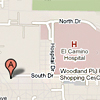Macular Degeneration
Macular degeneration, or age-related macular degeneration (AMD) is a leading cause of vision loss in Americans 60 years and older. It is a disease that destroys your sharp, central vision. Central vision is needed for seeing objects clearly and for common daily tasks such as reading and driving.
Age-Related Macular Degeneration affects the macula, the part of the eye that allows you to see fine detail. AMD causes no pain. In some cases, AMD advances so slowly that people notice little change in their vision. In others, the disease progresses faster and may lead to a loss of vision in both eyes.
AMD occurs in two forms: wet and dry.
Wet AMD
Wet AMD occurs when abnormal blood vessels behind the retina start to grow under the macula. These new blood vessels tend to be very fragile and often leak blood and fluid. The blood and fluid raise the macula from its normal place at the back of the eye. Damage to the macula occurs rapidly.
With wet AMD, loss of central vision can occur quickly. Wet AMD is also known as advanced AMD. It does not have stages like dry AMD.
An early symptom of wet AMD is that straight lines appear wavy. If you notice this condition or other changes to your vision, contact your eye care professional at once. You need a comprehensive dilated eye exam.
Dry AMD
Dry AMD occurs when the light-sensitive cells in the macula slowly break down, gradually blurring central vision in the affected eye. As dry AMD gets worse, you may see a blurred spot in the center of your vision. Over time, as less of the macula functions, central vision is gradually lost in the affected eye.
The most common symptom of dry AMD is slightly blurred vision. You may have difficulty recognizing faces. You may need more light for reading and other tasks. Dry AMD generally affects both eyes, but vision can be lost in one eye while the other eye seems unaffected.
One of the most common early signs of dry AMD is drusen. Drusen are yellow deposits under the retina. They often are found in people over age 60. We can detect drusen during a comprehensive dilated eye exam.
Sample Vision

Macular Degeneration

Normal Vision

 Mountain View Office
Mountain View Office Menlo Park Office
Menlo Park Office